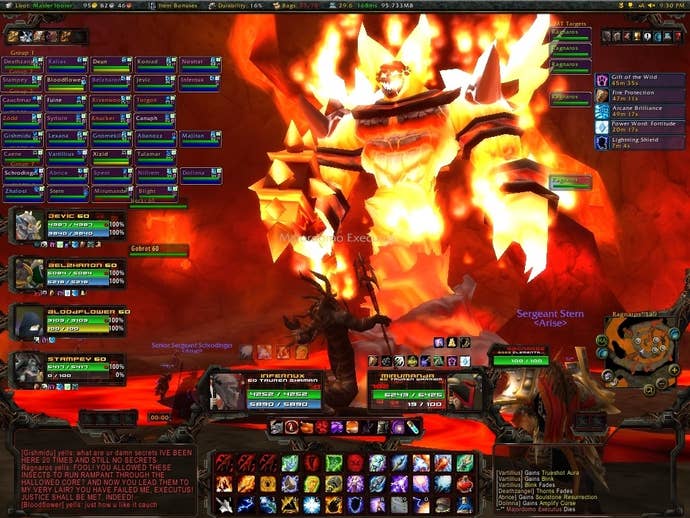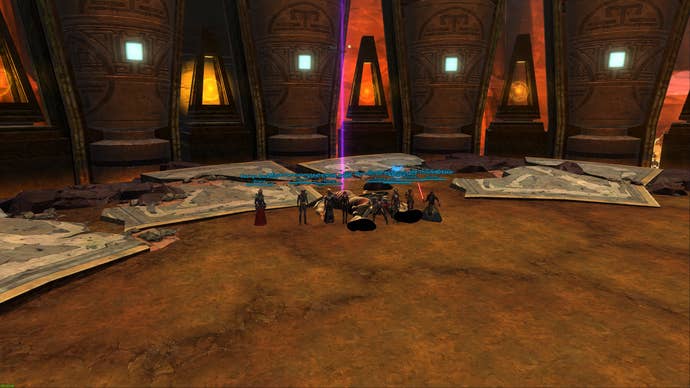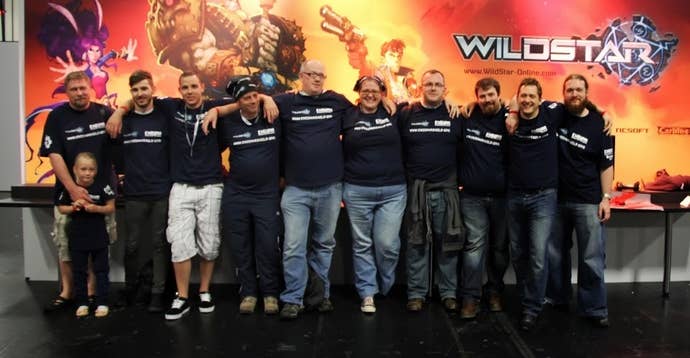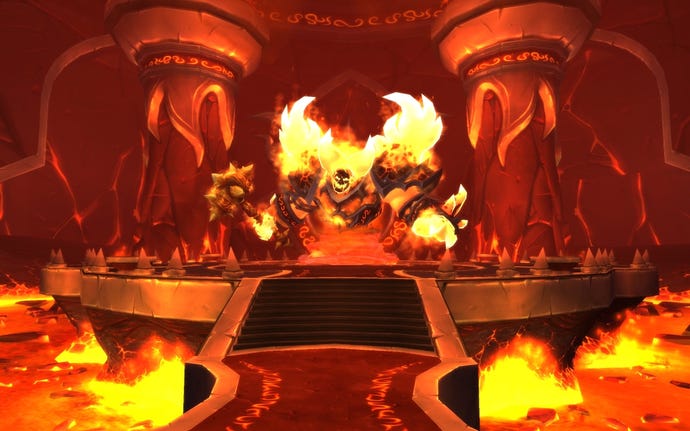The Story of a Raiding Guild with a PR But No Game
Dedicated, professional and putting in upwards of 25 hours a week, Enigma's a tribe without a home. Eurogamer's Robert Purchese investigates.
This article first appeared on USgamer, a partner publication of VG247. Some content, such as this article, has been migrated to VG247 for posterity after USgamer's closure - but it has not been edited or further vetted by the VG247 team.
"NOW FOR YOU, INSECTS! BOLDLY, YOU SOUGHT THE POWER OF RAGNAROS. NOW YOU SHALL SEE IT FIRSTHAND!"
I'd never seen anything like it. Not necessarily the Firelord too large to fit on my screen, but what he represented: months of hard work helping lead 40 actual people to the bottom of Molten Core, World of Warcraft's cavernous first endgame raid. Beating Ragnaros meant recognition as a serious raiding guild, and as I stood there worrying about the battle before me -- the different phases, the different tactics -- I couldn't help but remember the haphazard force we had once been, failing countless times on only the first of the nine bosses that came before. The feeling was intoxicating -- the memory still is.
That's why a curio stopped me in my tracks at this year's Rezzed game show in Birmingham, UK. It wasn't a game, nor was it a developer session; it was a group of people from around Europe collectively known as Enigma, a meticulously organised 40-person raiding guild. I understood where they came from. But what really intrigued me was that they had no home. And that they had a PR.
"We're a hybrid of customer-relations, HR, business process, corporate structure and military command and control, backed up by trust and transparency," leader Mizpah tells me in a follow-up phone call weeks later. Am I talking to a bank manager? No, I discover, an IT director, but the shoe still fits. He's eloquent, intelligent and a bit of a know-it-all, and he's used to leading large projects and large groups of people. The guild? "It is a business," he nods.
He was surrounded at Rezzed by a dozen or so Enigmates, each decked out in matching t-shirts with their character's name on and themed around the game they were all there to see: WildStar, the cartoony MMO made by Carbine and bankrolled by NCSoft -- the game Enigma desperately wants to call "home." Already, Enigma has the 50 people it feels it needs, pre-game, to be competitive in the raiding scene in the first tier of endgame content. By the end of the second tier, with a full roster of 80 raiders, Enigma hopes it can be competitive across servers regionally as well.
But, as I come to discover, Enigma has been in this position many times before.

Enigma was born in World of Warcraft seven years ago when a handful of members from a large but disorganised guild moved server to get serious about raiding. Their new home was The Venture Co, their faction Alliance, and it was, as founding member Farida tells me, a fresh start. That was November 2005. But it wasn't until January 2006, when Enigma took a floundering stranger under its wing -- a Bambi skating on MMO ice -- that the guild would begin to become what it is today.
"I'm the guy who took 63 days to level his first character while he worked out how to play the game," says Mizpah, that floundering stranger. "Quite literally!" But three months later, after a realisation that "if we applied some basic [business] principles it would help the guild grow stronger", he had become guild leader. "It was the obvious choice," remarks Shinogi, another of the old guard.
But Enigma was small and unknown and could only realistically field 20 freshly minted level-60s for a raid. Alone Molten Core (40 people) was out of reach, but Aztec troll raid Zul'Gurub (20 people) wasn't. The only problem was that it was hard, as fewer people meant fewer places to hide. "Basically the world, the server, the forums are going 'you're stupid, this isn't possible'," recalls Mizpah, yet on paper -- on spreadsheets -- it was. Just. So Enigma "stuck two metaphorical fingers up" to the world and dove in. "And we just went back there night after night after night because it was mathematically possible, and it was a trial by fire for the people and the personalities involved because we would not give up.
"I remember we used to get whispers [private messages] from some of the other less friendly guilds on the server going: 'Idiots -- you're in there again!' And I can't paraphrase the rest of the stuff they were throwing at us." Enigmates would have their equipment inspected and sneered at, Shinogi remembers. "Oh my god you're still wearing greens," they'd say, "how the hell do you think you're going to get past the first trash pack?"
But through calm, calculated persistence -- and a sprinkle of fun, apparently -- Enigma cleared that first trash pack. In fact, two weeks later, Enigma killed Hakkar the Soulflayer, the final boss of Zul'Gurub. "The most amazing thing about that kill is the level of excitement followed by the stunned silence when this thing actually died," says Mizpah. "Utter silence... Followed by just this explosion, and I still sense tingles down my spine. And that moment was the cruciform in which Enigma was formed. That moment was a 'we can do anything; we don't care what the rest of the world says. If we can plug it into a spreadsheet and it's possible: it's possible.'"
"That moment was the cruciform in which Enigma was formed."
Mizpah
Enigma was cheered by the people for flying in the face of the elitists, and the elitists -- those who hadn't managed Zul'Gurub under the same poorly-equipped conditions -- had bloody noses. Rivalries formed, and one would go on to result in an event that went down in The Venture Co history. It was known as the Mushroom Inc. incident.
By this time Enigma had progressed to the bottom of Molten Core and could field 40-person raids. But not all raiding was done inside instance-portals: some bosses were out in the open where they could be attacked by more than one raid at the same time. The Emerald Dragons were such bosses, and Emeriss among the hardest of them -- a scaly beast capable of turning fallen raiders into mushrooms that spew poisonous spores, damaging all around them and usually setting off a chain reaction of death and more mushrooms, wiping the raid out.
Two or three guilds effectively owned the Emerald Dragons on The Venture Co, until Enigma fancied a go. But the early attempts went badly and the other guilds would watch, wait and clean up. "It's a game, it's competitive, they've won it fair and square -- happy days," shrugs Mizpah. But fortune struck one night when Emeriss appeared and no other big guilds were around. Enigma had her all to itself. Hardened to the battle by now, Enigma steamed in, and the fight was going well... until something quite unexpected happened.
"The next thing we realize," says Mizpah, "just as we're approaching the kill, is this character called Funguy, who was a level-one gnome, comes running into the midst of the battle, promptly dies, sets off a raid wipe."
Ho ho ho, how they all laughed -- and they actually did -- before they tried again. "The next thing we know, another one comes in and another one comes in, and we realise that we have, basically, an unknown series of anonymous people with random names sitting there as level-one gnomes for the precise purpose of stopping us killing this dragon." And to whom do you think the gnomes belonged? To a brand new guild called Mushroom Inc.
Enigma dug in -- it would not be beaten by these trolls... um... gnomes. "We would out-stubborn these individuals called Mushroom Inc.," Mizpah says, his hunter's gloved fist slamming down on an imaginary oaken table in my mind. That's when the rigorous organisation of the guild came into its own, because by rotating the members of its raid to allow them to rest or go to work, Enigma was able to keep 40 people in place, dragon-ready, for an astounding eight hours.
Then something equally quite unexpected happened. "We actually, believe it or not, had the top Horde guild come in, who heard about the whole thing going on, and basically kill those guys every time they tried to interfere," Shinogi recalls.
"We eventually got the kill," says Mizpah, "we eventually wore them down and we eventually did it. It's an event that's been talked about for a very long time ever since."
"In hindsight, cutting a few people and continuing with The Burning Crusade would have been the better option."
Farida
Enigma would go on to dip into the prestigious European WOW rankings while smashing through Naxxramas, Mizpah tells me, netting a server-first kill of Instructor Razuvious, the death knight with pointy shoulder pads. Enigma had become a serious player. But as the guild came into its own, Blizzard moved the goal posts, deciding 25-person raids were the way to go. Enigma was built for 40-person raids, and to a tee, so it had a real problem on its Euro-hands. The options were telling Enigmates they could only join one raid in every seven; establishing two teams but risking one being seen as superior; or cutting the guild down to size. "There were just no good solutions," rues Mizpah. That's when Enigma's nomadic life began.
With each new MMO contender came the hope of a new home. There was Vanguard: Saga of Heroes, Age of Conan, EverQuest 2, The Lord of the Rings Online, Pirates of the Burning Sea, Perpetuum, Star Wars: The Old Republic and Guild Wars 2. Some were good, some bad, but none lasted for very long -- none had the special 40-person raiding ingredient Enigma was looking for. "In hindsight," muses Farida, "cutting a few people and continuing with The Burning Crusade would have been the better option." And Enigma did drift back to World of Warcraft, usually in step with expansions, but the roots would never burrow in quite the same way. "But in the end," adds Farida, "it led us to become stronger."
"The people in Enigma, we're fiercely proud to be part of it and we protect it fiercely."
Mizpah

To become part of Enigma's raiding team you have to be at least 21 years old and able to dedicate 20-25 hours a week to the guild. You must attend a minimum of three planned structured raids a week, and sometimes more, and you must have all your potions packed plus any equipment you may need. Your character must be well kept and you must be familiar with what lies ahead. Realistically, Mizpah tells me, 20-25 hours a week is a minimum. "I'd be very surprised if most of our guys aren't in excess of 50, and some in excess of more, but let's not go there!"
Even if you meet that criteria there's no guarantee you'll get in. "The people in Enigma, we're fiercely proud to be part of it and we protect it fiercely," states Mizpah, "we vet heavily, without being cliquey, who can come in, because our reputation and who we are is so precious to us." The application form is long by design, so as to filter out the can't-be-bothereds, and the interview process is described as "torturous" so it reveals your true colors.
"If someone's attitude is right, we can bring them up to damn-high levels of raiding. It's teamwork, it's coordination, it's practice, it's effort, it's number-crunching -- it's all these things. And if your attitude is right it can be taught, and we're happy to invest the time in the right people to do that. And I guess that makes us a little different."
What also makes Enigma different is the near-indoctrination seeping from every member. "Pro bonus dolus, pro palmo ego", they preach -- "for the good of the guild before the good of self". "It's not just a motto that people throw around because people can throw it around," observes Pseudo Nimh, the PR I mentioned earlier (and it's her duty, among other things, to make sure that ethos exudes outwards as well as in). "No, it's almost as if they eat, breathe and sleep it."
It's illustrated perfectly in the way Enigma dishes out its hardly fought for loot. When I used to raid Molten Core, raiders accrued DKP (dungeon kill points) for attendance and boss kills, and bid amounts of DKP on loot they wanted that dropped. It was a fair way of doing things. But Enigma, a virtual commune by comparison, only uses DKP as a last resort.
If a powerful magical sword drops and it's a choice between a newcomer with a bad sword or a veteran with a good sword as to who should get it, then the newcomer will win, because that damage boost more positively affects the raid. "Nine times out of 10 we have people going, 'Oh no no no -- you take it.' 'No! You take it because it's better for you.' 'Oh no no no -- he is best to take it because it's best for him,'" says Shinogi. "I've never heard of that anywhere else," adds Mizpah, and nor have I.
"If you're smart about stuff ... you actually can turn around and be competitive at that '20-25 hours a week level'."
Mizpah
Raiding gets a terrible rep. Those MMO horror stories of addiction and people having bust-ups over loot: they're almost all related to raiding, particularly the 40-person kind. Perhaps that's why Blizzard ditched them. "There has to be a prioritization of real life," insists Mizpah. "People have to have the capabilities of what they're doing without having negative impacts elsewhere." He's booted an Enigmate off the raid roster for a month because that person had exams looming and was playing too much.
"If you're smart about stuff, if you're organised, if you plan stuff effectively, you actually can turn around and be competitive at that '20-25 hours a week level'. Let's not say we've got to do this for 10 hours a day for a week; we've got real lives, we've got all sorts of other commitments -- let's find a way that works for us."
Mizpah, personally, pours huge amounts of his time into ensuring his guild is set up for WildStar -- around four hours a night. "It is a second job," he admits, "but it's a second job, frankly, because I want it to be." He's cool when I ask whether he can sustain this level of commitment indefinitely, because I am in no doubt the success of Enigma hangs on him, however many times he references the hard work everyone else puts in. He's even got plans to merge aspects of his real job and hobby job in the not too distant future, via online guides and things like that. But what his significant other and his two Alaskan Mamalutes think about the time he spends running Enigma he didn't say. I'm sure he'd say they were supportive, and no doubt they are.
Two of the four people I speak to are in relationships and two live alone, and all have jobs. Enigma doesn't raid on a Friday night or Saturday night so they're free to go out and socialize without missing out. But when they're not at work, even when they're not playing anything, they all sit on TeamSpeak chattering away. They play other kinds of online games together, they hang out, they chip in with advice on building computers or buying presents for other halves -- they even turn up and help each other move house or repair a house, as Mizpah recalls: "I buy a house and find it's got condemned, and around nine people fly into the country to help me with the work to put it back together."
A memory is triggered and he continues: "You asked for a guild highlight: two years ago there was a random 'you know guys we're really not meeting up in real-life enough' [talk]. A few weeks later I had 15 people sleeping in my front room and the rest of the house from 11 countries. That, actually, would remain one of the highlights of guild life for me."
They even teach each other useful work-related skills like Drupal, so people can build and maintain websites. Farida learned from Enigma how to go about a proper business meeting long before he did at school. And, of course, they fly across Europe to meet each other at a game show in the UK called Rezzed.
"We have goals and agendas within games," says Pseudo Nimh, "but at the end of the day it's the people behind the pixels, it's the community that we're building together. It's about spending time together accomplishing tasks that we set out for ourselves and having fun doing it, enjoying each others company and laughing at things -- so yeah, the dreaded fun-bomb."
"The biggest claim to fame," Mizpah adds, "is that we've now been around for the best part of a decade with a bunch of the original members still very happy here."
"...trying to schedule for 40 people is extremely difficult."
Guild Wars 2's Mike Zadorojny

Is Enigma chasing a phantasm, that of World of Warcraft's past? It's a notion I can't shake. Blizzard washed its hands of 40-person raids and all the copycats followed suit. Today's MMO gamer wants stuff now, notices Mizpah, and I believe developers are too worried about securing gigantic returns on their games not to give it to them. That's why I told Guild Wars 2 lead content designer Mike Zadorojny about Enigma. I wondered whether ArenaNet thought content only large organized raids could conquer was some kind of taboo. "It is challenging," he says, "because if you require large number of players it is extremely hard unless you are part of the dedicated few who can really support 40-man groups. I mean I was one of those back in the day as well, and trying to schedule for 40 people is extremely difficult."
Guild Wars 2 uses tiered dynamic events to suck you and those around you into large battles -- you don't have to turn up organized but eventually you're an army killing a huge boss. It's one way of getting around that off-putting initial requirement. "So I don't think it's off the table," he says of large-raid content. "People can still do that, you just have to be creative about how you're doing it."
But that's not what Enigma wants. "Yeah that stuff should be hard to learn," counters Mizpah, "it should take time, but are the rewards an awful lot higher when you get there in terms of satisfaction? In spades. If there are no aspirational goals in a game, how do the majority of gamers pick up on a target to strive for and acquire a mentality of 'we want to get better, we want to be more challenged'?"
"Our home is ourselves."
Mizpah
Back we come to the doorstep of WildStar, where Enigma stands, bags packed, ready to move in. "After disappointment after disappointment with other games you turn cynical," acknowledges Farida. "Jaded," adds Pseudo Nimh. But Mizpah has reason to believe in WildStar, because he was one of a few community members flown to see the game for two days at a special behind-closed-doors event. "I walked away not panicked and not disappointed about the future direction of the game." Non-disclosure agreements prevent him saying much else.
If WildStar doesn't work out, Enigma will keep looking, like it always does, and there's new hope in what the indie and Kickstarter scene might throw up. "We're always going to have our eye on that horizon," says Pseudo Nimh, because lasting memories are built from doing big things together.
But what if Enigma is chasing a dream and never finds a home? Even traditional MMOs are struggling to stay relevant. "Our home is ourselves," answers Mizpah. "We are not represented in total by the game we play; the game we play is a massive part of our articulation, our focus -- a means and a mechanism to let us do what we do -- but the guild itself is its own living, breathing entity, and that is more than the sum of its parts."
"In the end it's just a group of friends now," Farida adds, "and that's something that will persist without a game -- we'll make our own fun. We'll always be that core group of friends."
"I'm an Enigmate," Pseudo Nimh declares. "I'm an Enigmate for life."




